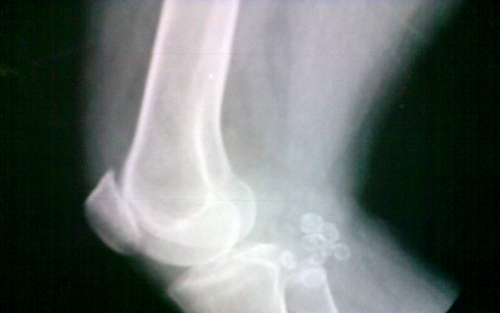28 April 2017. Editing the genes in stem cells is shown to produce cartilage that in lab tests releases therapeutic proteins only when needed to relieve joint inflammation in arthritis. A team from Washington University in St. Louis, Duke University, and the company Cytex Therapeutics, describes its process in yesterday’s issue of the journal Stem Cell Reports.
Researchers led by Washington University orthopedic surgery professor Farshid Guilak are seeking more targeted treatments for arthritis that results in joint swelling, pain, and stiffness. The term arthritis applies to as many as 100 different joint disorders that affect 53 million adults in the U.S., according to Arthritis Foundation. Osteoarthritis is the most common type of the disease, where cartilage cushioning the joints wears away over time, causing inflammation and pain. Rheumatoid and psoriatic arthritis result from autoimmune malfunctions, where the immune system attacks the joints causing inflammation and pain.
Some current drugs for relieving arthritis symptoms are designed to relieve the inflammation and pain associated with the disorder, by blocking signals from proteins such as interleukin-1 and tumor necrosis factor-alpha, or TNF-alpha, that promote inflammatory responses. While often effective remedies for arthritis symptoms, these drugs are taken systemically, which means they block interleukin-1 and TNF-alpha signals that operate throughout the immune system. And as a result, people taking these drugs run a risk of adverse side effects, such as infections, where these protein signals may be needed.
Guilak, formerly on the faculty at Duke University, and colleagues devised a solution that would enable cells to block inflammatory protein signals only in response to inflammation and in the joints where it occurs. The team’s strategy uses cartilage cells derived from stem cells edited with the genome-editing technique known as Crispr, short for clustered regularly interspaced short palindromic repeats. Crispr is based on bacterial defense mechanisms that use RNA to identify and monitor precise locations in DNA. The actual genome editing in this case uses an enzyme known as Crispr-associated protein 9 or Cas9. RNA molecules guide the Cas9 editing enzyme to specific genes needing repair.
For this study, researchers derived their stem cells from skin on the tails of lab mice, which the team grew in the lab for editing with Crispr-Cas9. The editing step added elements to the stem cell gene controlling the response to inflammation that, in effect, switches on the response blocking interleukin-1 and TNF-alpha proteins only when encountering these inflammatory signals. The researchers then cultured the stem cells into cartilage tissue similar to that found on joints.
Tests in lab dishes show the engineered cartilage tissue produces the blocking actions only when exposed to inflammatory proteins, with the response ending when the inflammation signals also end. In addition, these programmed responses increase or decrease depending on the strength of the inflammation signals, suggesting these responses could be calibrated to reflect the extent of inflammation.
The authors envision their process as a way to deliver vaccine-type therapies for arthritis that treat the condition only in the joints, and when inflammatory signals occur. “If this strategy proves to be successful,” says Guilak in a Washington University statement, “the engineered cells only would block inflammation when inflammatory signals are released, such as during an arthritic flare in that joint.”
Cytex Therapeutics Inc. is a spin-off company from Duke University in Durham, founded by Guilak and others to develop engineered cartilage as a treatment for arthritis, particularly younger individuals years or decades away from joint replacements. As reported in Science & Enterprise, Guilak’s lab at Washington University and Cytex in July 2016 reported on development of joint cartilage for people with arthritis, using stem cells seeded by gene therapy.
More from Science & Enterprise:
- Genetic Techniques Speed Brain, Muscle Cell Production
- Trial Begins Testing Enhanced Cord Blood Stem Cells
- Tissue Regeneration Start-Up Gains $33M in Early Funds
- Electronic Gene Editing Corrects Inherited Blood Disorder
- Neurology Drug Signals Shown to Help Tooth Repair
* * *


 RSS - Posts
RSS - Posts
[…] (Akha, Wikimedia Commons) http://sciencebusiness.technewslit.com/?p=30775 […]